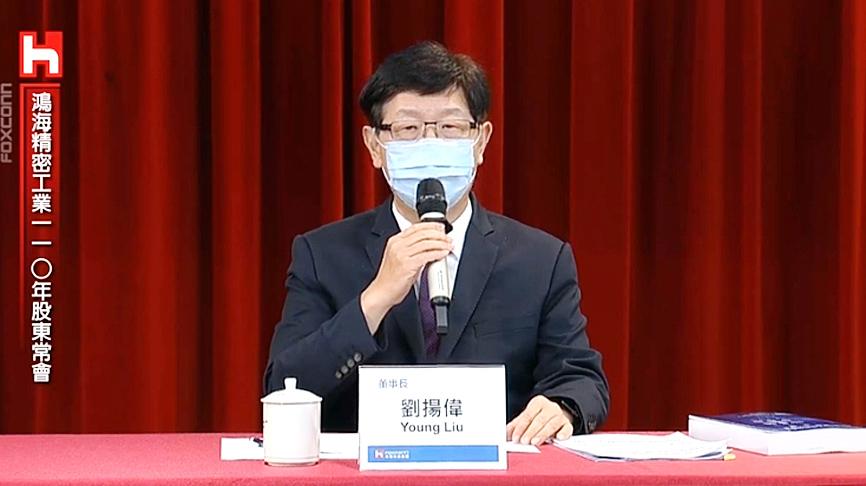Hon Hai Precision Industry Co (鴻海精密) yesterday said that its shareholders had approved a proposal to distribute a cash dividend of NT$4 per common share, the highest in 20 years.
The iPhone maker also said it was upbeat about its prospects for the second half of the year.
“The global parts supply shortage is of limited impact for us now,” Hon Hai chairman Young Liu (劉揚偉) said at the company’s annual general meeting in New Taipei City’s Tucheng District (土城). “I am optimistic about the rest of the year.”

Photo: screen grab from the Internet
The company expects minimal impact from the floods in China’s Zhengzhou City, where it has key production facilities, Liu added.
The Zhengzhou facilities in Henan Province supply the bulk of the company’s iPhone manufacturing capacity, but they have been spared from the floods, Hon Hai said.
“All our iPhone facilities remain fully functional,” although due to the severity of the floods, it has affected staff getting to and from work, the company said.
“Reports of a flooded Hon Hai facility is a small desktop component [operation] outside the main industrial park,” he added.
Liu also issued a statement touting Hon Hai’s efforts to grow its electric vehicle (EV) business, emphasizing the importance of forming a complete and collaborative supply chain with other companies through the MIH — Mobility in Harmony — alliance.
The alliance, which became an independent non-profit entity this month, now boasts 1,800 supply chain members and hopes to become “the Android of EVs” — an open standard to facilitate cooperation between suppliers.
Liu said that regional production is a “growing trend” and that it is inevitable that Hon Hai would create self-sufficient supply chains globally.
“We will take our experience of integrating vertically in China and working with various suppliers and replicate it all over the world,” Liu said.
Although Hon Hai is best known as the world’s largest contract electronics maker and a leading assembler of Apple products, Liu said he is looking forward to the EV business making a contribution.
“We will first see some results from key EV component sales, with whole vehicle sales starting from the fourth quarter of 2023,” Liu said.
“By 2025, we hope that 10 percent of EVs will contain some Hon Hai components,” he said.
Hon Hai’s EV line will start with electric buses, sedans and scooters, and the company will “continue to seek opportunities for collaboration around the world,” he said.

South Korea’s equity benchmark yesterday crossed a new milestone just a month after surpassing the once-unthinkable 5,000 mark as surging global memory demand powers the country’s biggest chipmakers. The KOSPI advanced as much as 2.6 percent to a record 6,123, with Samsung Electronics Co and SK Hynix Inc each gaining more than 2 percent. With the benchmark now up 45 percent this year, South Korea’s stock market capitalization has also moved past France’s, following last month’s overtaking of Germany’s. Long overlooked by foreign funds, despite being undervalued, South Korean stocks have now emerged as clear winners in the global market. The so-called “artificial intelligence

NEW IDENTITY: Known for its software, India has expanded into hardware, with its semiconductor industry growing from US$38bn in 2023 to US$45bn to US$50bn India on Saturday inaugurated its first semiconductor assembly and test facility, a milestone in the government’s push to reduce dependence on foreign chipmakers and stake a claim in a sector dominated by China. Indian Prime Minister Narendra Modi opened US firm Micron Technology Inc’s semiconductor assembly, test and packaging unit in his home state of Gujarat, hailing the “dawn of a new era” for India’s technology ambitions. “When young Indians look back in the future, they will see this decade as the turning point in our tech future,” Modi told the event, which was broadcast on his YouTube channel. The plant would convert

‘SEISMIC SHIFT’: The researcher forecast there would be about 1.1 billion mobile shipments this year, down from 1.26 billion the prior year and erasing years of gains The global smartphone market is expected to contract 12.9 percent this year due to the unprecedented memorychip shortage, marking “a crisis like no other,” researcher International Data Corp (IDC) said. The new forecast, a dramatic revision down from earlier estimates, gives the latest accounting of the ongoing memory crunch that is affecting every corner of the electronics industry. The demand for advanced memory to power artificial intelligence (AI) tasks has drained global supply until well into next year and jeopardizes the business model of many smartphone makers. IDC forecast about 1.1 billion mobile shipments this year, down from 1.26 billion the prior

People stand in a Pokemon store in Tokyo on Thursday. One of the world highest-grossing franchises is celebrated its 30th anniversary yesterday.